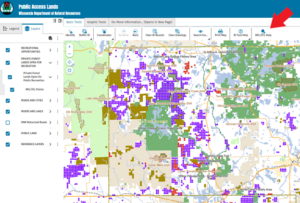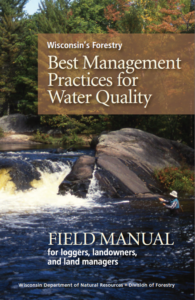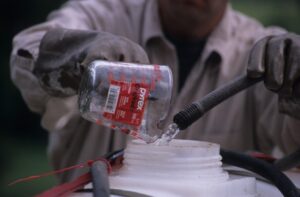 Two forestry pesticides now have an Environmental and Social Risk Assessment (ESRA) available on the MFL Certified Group Pesticide Page courtesy of our colleagues at the Pennsylvania Department of Conservation and Natural Resources. Tebufenozide is an insecticide that can be used to control spongy moth. Aminocyclopyrachlor is an herbicide used to control broadleaf plants.
Two forestry pesticides now have an Environmental and Social Risk Assessment (ESRA) available on the MFL Certified Group Pesticide Page courtesy of our colleagues at the Pennsylvania Department of Conservation and Natural Resources. Tebufenozide is an insecticide that can be used to control spongy moth. Aminocyclopyrachlor is an herbicide used to control broadleaf plants.
Managed Forest Law
BMPs and MFL
Whether or not you are in the Managed Forest Law (MFL) Certified Group, we recommend adhering to all applicable Forestry Best Management Practices for Water Quality (BMPs) to protect the soil and water resources on your property. During forest management, there are measures we can take to minimize rutting, soil compaction and erosion and protect the value of any water features on the site. Familiarizing yourself with the water features on your property from the BMP perspective will help you ensure that when it comes time to harvest timber or put in a road, you take the necessary measures to protect what is important to you.
As described in Wisconsin’s BMP Field Manual, BMPs are a set of guidelines “intended to provide simple and cost-effective methods for protecting water quality in lakes, streams and wetlands… before, during and after forest management activities”. BMPs are designed to protect water quality, water temperature, nutrient balances, habitat diversity and hydrologic processes.
Got Oak? Need Funding?
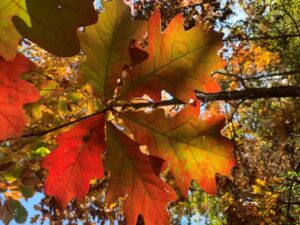
The American Bird Conservancy has teamed up with U.S. Department of Agriculture’s Natural Resources Conservation Service (NRCS) to provide additional funding to help manage oak woods in Southeast Wisconsin. This Regional Conservation Partnership Program is designed to enhance oak ecosystem health while cultivating long-term benefits for Species of Greatest Conservation Need, such as the red-headed woodpecker and cerulean warbler, both commonly found in high-quality oak systems.
Roger Pluedeman: A Longtime Logger With Long-Term Planning
By Art Kabelowsky, DNR Outreach and Communications, Fitchburg
Arthur.Kabelowsky@wisconsin.gov
For 48 years and counting, Roger Pluedeman has been a logger.
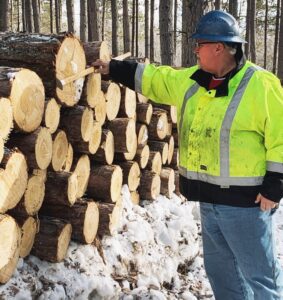
Photo Credit: Roger Pluedeman
And much more.
After starting his career in Rhinelander in 1977, Pluedeman moved to the Eagle River area in 1979 and established Pluedeman Logging. He has owned and operated that business ever since.
The basic roles of a logger have become second nature to Pluedeman: Forge contracts with landowners, make detailed plans, cut down trees and turn them into logs and remove the logs for transport to their destination.
But Pluedeman also excels at the people side of logging: Developing and growing long-term relationships, both with landowners and with the land itself.
“He’s not a ‘look what I did’ guy. He’s known as a guy who gets the work done and helps where he can,” said Henry Schienebeck of the Great Lakes Timber Professionals Association, who has known Pluedeman for decades.
“Roger’s work includes a lot of long-term relationships, and that goes to show that whomever he’s working with, he’s treating them fairly.”
Continue reading “Roger Pluedeman: A Longtime Logger With Long-Term Planning”
Julie Church Joins the Tax Law Section

Photo Credit: Julie Church
Julie Church has joined the Tax Law Section as our Tax Law Operations Specialist. Julie oversees the Certified Plan Writer (CPW) program, assists with tax law policy and program management and helps manage the Wisconsin Forest Inventory and Reporting System (WisFIRS). She serves as a key liaison for various stakeholders, including Cooperating Foresters and CPWs. She started her new role in November 2024, and is stationed in Rhinelander at the Forestry Headquarters. Continue reading “Julie Church Joins the Tax Law Section”
2025 New MFL Enrollments
New Managed Forest Law (MFL) enrollments become active at the start of the year to align with the new property tax year. There are 1,370 new enrollments for 2025! Some statistics for the new enrollments include:

Photo Credit: Linda Williams, Wisconsin DNR
- Nearly one-third are new landowners in the MFL program, similar to recent years’ enrollments.
- A total of 88,105 acres were added to the MFL program.
- 1,352 enrollments are individual landowners, and 18 added land to large ownerships with at least 1,000 acres statewide.
- The average size of the new enrollments is 61 acres for individual landowners and 302 acres for large ownerships.
- 10,356 acres are open to the public for hunting, fishing, hiking, sight-seeing and cross-country skiing.
- 43% (4,453 acres) of the open MFL acreage is part of a large ownerships.
- 71% of eligible new enrollments elected to participate in the MFL Certified Group.
- The total number of 2025 enrollments amounts to less than the 1,452 enrollments that expired at the end of 2024, but the total new acreage enrolled in MFL in 2025 is almost 15,000 acres more than the total of the acreage that expired.
Another Year Of Successful Audits For The MFL Certified Group
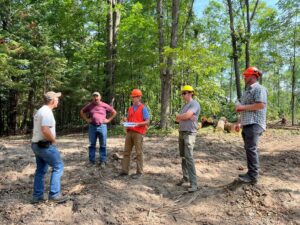
A logger, a consulting forester, an auditor and DNR staff discussing an active timber harvest. Photo Credit: Allen King
Each year, the MFL Certified Group participates in two audits – one internal and one external – to maintain forest certification status and continually improve as a forest management organization. The internal audit, as the name would suggest, is conducted internally by DNR staff. The external audit is when a team of third-party auditors visits Wisconsin to evaluate the MFL Certified Group to American Tree Farm System® (ATFS) and Forest Stewardship Council® (FSC) requirements.
Highlights From The Internal Audit
The internal audit took place on April 29 and 30 and included site visits to 40 certified MFL properties in Ashland, Barron, Buffalo, Dunn, Eau Claire, Pierce, Sawyer, Trempealeau and Washburn counties within the Northwest Tax Law Team. The internal audit showcased a lot of superb forest management and several other positive outcomes, including:
- High level of landowner satisfaction with the MFL program and local MFL staff.
- Investment in landowners, loggers and consulting foresters both through one-on-one engagement and larger efforts such as mandatory practice workshops.
- Commitment to improving understanding and consistency through peer-to-peer check-ins and consulting with subject matter experts such as the DNR forest hydrologist and silviculturists.
The internal audit team also observed three instances where post-harvest road construction best management practices were absent or not fully implemented. None of these instances, however, generated any negative on-the-ground impacts. One instance of failed regeneration was also observed. All four of these findings are being addressed locally between landowners and Tax Law staff.
The discussions and corrective actions that occur during and after these internal audits contribute to shared understanding and improved implementation of forest certification among the DNR staff, landowners and external partners that play a role in the MFL Certified Group. Continue reading “Another Year Of Successful Audits For The MFL Certified Group”
MFL Certified Group Pesticide Reporting Reminder

As a Certified Group, we aim for 100% pesticide reporting on certified MFL Lands. Recent articles have described the pesticide reporting requirements for forest certification. As we approach the end of the year, this is a reminder to submit your report if any pesticides have been applied to your certified MFL property in the past year. Certified MFL landowners are encouraged to report pesticides soon after they are applied, or on an annual calendar year basis. You can use the worksheet to track pesticide applications to facilitate reporting.
Thank you to everyone for submitting their pesticide report(s).
Submit a pesticide-use report.
If you have questions about pesticide reporting, please email DNRMFLForestCertification@wisconsin.gov.
Updated Guidance Brings Timely Reminders For Landowners Enrolling Land In MFL
Did you know that Certified Plan Writers (CPW) received new Forest Tax Law Handbook procedures earlier this year for creating approvable MFL applications and management plans? CPWs are required to follow DNR guidance, and as the voice of the MFL program during the enrollment process, the CPW is required to discuss and confirm your, the landowner’s, understanding of a lengthy list of MFL program requirements and conditions of enrollment. Please see below for some timely reminders of the MFL landowner’s roles and responsibilities as we head into the plan writing season for 2026 enrollments.
Delinquent Property Taxes Must Be Paid
- Lands with delinquent property taxes are ineligible for designation. Any delinquent taxes must be paid by Oct. 1 the year before the land is designated.
- If split payments are made or if there are delinquent taxes, the landowner, upon request of the DNR, must provide proof of full payment.
- By Aug. 15 of the year in which the MFL order will be issued, the DNR will notify each county treasurer of MFL applications to determine if there are unpaid property taxes. Notifications are sent after the July 31 split property tax payment date. If the department is notified of delinquent taxes, Tax Law Forestry Specialist will assist the landowner and determine if taxes are paid or if the application will be denied entry.
Continue reading “Updated Guidance Brings Timely Reminders For Landowners Enrolling Land In MFL”
Open MFL Maps Now Available In Public Access Lands Web Map
This summer, the DNR rolled out the new Public Access Lands web map. This new web mapping application consolidates various types of public access land information. It also incorporates open Managed Forest Law (MFL) and Forest Crop Law (FCL) properties and replaces the previous Private Forest Lands Open for Public Recreation application. You can learn more about this tool by checking out the press release.
There are a couple of easy steps to follow to view the open MFL and FCL properties. There is also an “MFL/FCL Help” button located on the right side of the top toolbar, if you’re having problems viewing the open MFL/FCL layer.
Good luck this season, and please refer to the open tax law lands page for more information and to find answers to common questions about hunting and access to these properties.
